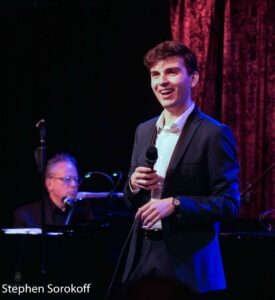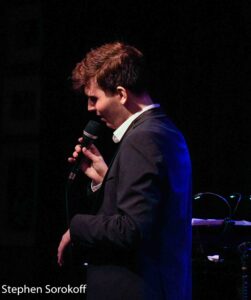ON THE TOWN WITH CHIP DEFFAA: CATCHING DAVID MARINO’S BIRDLAND DEBUT….
On March 4th, 2024, I witnessed the best major-club debut I’ve seen in years. And I kept thinking, as I watched David Marino sing, “The good old days are now…”
ON THE TOWN WITH CHIP DEFFAA: CATCHING DAVID MARINO’S BIRDLAND DEBUT….
[avatar user=”Chip DeFFaa” size=”96″ align=”left”] Chip DeFFaa, Editor-at-Large[/avatar]
Sometimes I’ll look at an old newspaper clipping that someone will post online, showing the wonderful performers playing in New York clubs long ago, and I’ll think, “Those were the days.” And I’ll think how great it must have been to have seen so-and-so at the very start of his or her career, before they became famous, when they were first singing in intimate clubs. It’s easy to romanticize the past.

David Marino, with Billy Stritch at the piano (Photo by Stephen Sorokoff)
And then I’ll have an experience like the one I had the other night at Birdland Jazz Club, and I’ll count my blessings to be alive at this very moment.
On March 4th, 2024, David Marino, accompanied by Billy Stritch’s trio, performed his first-ever show of his own at Birdland Jazz Club. And I’m so glad that I was there.
This was the best major-club debut I’ve witnessed in many years. And that’s saying plenty, because I’ve seen countless performers over the years and I choose my words with care. I’ll remember this night.
I was glad to experience his talent. (Oh, he has tremendous potential!) And I was glad I also got to share in his sheer joy, as he shared that talent with us.
This was the first time I’d seen him “live.” I’d been terrifically impressed by videos he’d posted on YouTube of him singing at home such songs as “I’ll Never Smile Again” and “Do I Love You.” And I wanted to see him in person.
It was a terrific night. There were so many lovely moments…. Marino, who is from Montreal, sang in both English and French. And even though I don’t speak French, he got to me just as thoroughly when he was singing in French as when he was singing in English. The emotion came through. There was no language barrier. (I found myself remembering seeing Fairuz, the legendary Arabic singer, years ago in Beirut; I don’t speak Arabic, but her musicality, feelings, sincerity all touched me thoroughly. It’s neat, and rare, when that happens.) And he’s got a gorgeous voice. I love the way he handled “Is it Love or is it a Dream?”

David Marino (Photo by Stephen Sorokoff)
He sang (in English) Henry Mancini’s “Charade” about as well as I’ve ever heard that ballad sung. And Billy Stritch, who was masterful throughout the evening–he’s a superb accompanist, as good as it gets–contributed so much on that number with his subtle, delicate musical support. And–an unexpected treat–Stritch sang with Marino on Irving Berlin’s infectious counterpoint number “You’re Just in Love.”
Marino offered dapper, jazz-inflected takes on Berlin’s “Steppin’ Out with My Baby” and “Let Yourself Go,” and Jerome Kern & Dorothy Fields’ “I Won’t Dance.” On the latter song, he put a big smile on the face of one woman in the audience by singing a bit of it directly to her. That was a sweet moment. (And I’d encourage making more eye contact with individual audience members; singing in an intimate club gives you that chance to make such connections. And audience members love that feeling, “He was singing just for me.”)
Cole Porter’s “I Happen to Like New York” worked well for him, too. He’s got an interesting voice— attractive both when it’s surprisingly big and full and strong (think of a young Eddie Fisher), and also when he wants to sustain softly crooned notes (think of Frank Sinatra with Tommy Dorsey). He offered Sondheim’s “Take Me to the World” and the Gershwins’ “They Can’t Take that Away from Me.”
I also liked hearing Oscar Levant’s “Blame it On My Youth.” It’s a fine, intriguing song, not heard too often in the clubs. I welcomed hearing it. And oh, I hope I may live many more years, because right now David Marino is a young singer at the start of his career, and he’s terrific for his age. But I’d love to hear how he’ll interpret that song in 10 or 15 years; I have a hunch he’ll find even more in the lyrics as he gains more life–experience. It’s one of those songs that you can sing with greater depth, meaning, and poignance when you’ve had your heart broken a few more times. (Sinatra, for example, was already an excellent singer–as Marino is–when he was in his early 20s; but he interpreted lyrics better as he grew a bit older.)
But Marino held me with every song. My friend and I were seated at a table front-row center (my favorite spot). Close enough to see Marino’s eyes begin to well up as the emotion of the night filled him. He introduced his parents in the audience. He said the night was, for him, a dream come true. He teared up a little. Some performers don’t like letting their true feelings show so openly. but I like performers who are in touch with their feelings, and it’s a good thing if emotions sometimes spill over like that. You want to connect emotionally with your audience. And if you want to reach your full potential as a singer, and connect as deeply as possible with listeners, you need to let yourself be vulnerable, to let emotions express themselves.
He has a bright future. And he had a very good, appreciative audience. There were a number of fine singers in the house, clearly enjoying the show–the most notable being Seth Sikes (my favorite singer of his generation) and Nicolas King. It’s always a good sign when other good singers–who know talent–come to see you. And after the show, Seth Sikes, whom I’ve known since the start of his career in New York, introduced me to David Marino; we’d never met in person. But Marino’s talent is obvious—just as Seth Sikes’s was, when I first met him, a couple of decades ago. And I spotted in the house various other showbiz pros, from Broadway and cabaret veteran Joan Jaffe to noted producer/director Richard Alexander. Word is getting around.
Marino could not have asked for better backing than from Billy Stritch’s trio, with Tom Hubbard on bass and Daniel Glass on drums. And I found him very likeable when he spoke to us between songs, whether he was telling us a bit about his parents and grandparents, or offering us a glimpse of himself when he first came to New York City. (He described himself, quite nicely, as “a polite Canadian boy” being told off by some hardened New Yorker “for daydreaming in the street.” I liked that. And I liked him.) He’s also got a light in his eyes, like he’s glad to be alive, glad to be here with us. Can’t beat that. I brought my camera with me, but I was so caught up in his performance, I forgot to take a single photo. (I’m grateful to Stephen Sorokoff, who captured the night on film, for letting us use his work.)
All in all, it was really an auspicious debut. I hope Marino will be back soon.
If I can make a request, I’d love to someday hear him sing “live” “Do I Love You?” or “I’ll Never Smile Again,” which he’s sung so wonderfully on videos he’s posted on YouTube; they’re not just first-rate songs, those songs fit him particularly well, and provide good exposure for the prettiest part of his voice. (“The Song is You” would be another good song for him to consider, for the same reasons.) Bing Crosby was an appealing singer from his very first recordings. But I remember Crosby noting, in one unusually insightful interview, that it took him some years to figure out just what part of his voice sounded best; once he figured that out, he added, he consciously worked at making sure he picked songs and arrangements that showed his voice to its very best advantage.
* * *
I just want to add a little postscript about Birdland. The original Birdland Jazz Club was one of New York’s top venues in the 1950s and early ’60s. And in my youth, I owned jazz albums by Count Basie, Joe Williams, Art Blakey and others recorded “live at Birdland.” Those albums helped spread the club’s fame, helped give it a mystique. But times changed and eventually the original Birdland went out of business.
In 1986, I was writing for the New York Post entertainment department when I heard that a new Birdland was going to open. I was skeptical about its chances for survival; most clubs come and go pretty quickly. And I thought Birdland’s moment had passed.
But in 1986 Gianni Valenti opened the new Birdland—located for its first decade at Broadway and 105th Street, and for the last 28 years at 44th Street, just west of Eighth Avenue. And Valenti has kept this club thriving. It’s one of the city’s top nightspots.
Valenti keeps coming up with good mixes of emerging artists (like Marino) and seasoned pros. And he keeps the prices reasonable. (You can have a burger and fries for dinner for $20.) He deserves credit, and recognition. (And so, too, does Jim Caruso, whose Monday night “Cast Party” at Birdland, has given many young artists a place to break in.)
We shouldn’t take these top clubs—maintaining such high standards, year after year–for granted. I sat there, Monday, taking in Marino’s Birdland debut, very glad to be there.
— CHIP DEFFAA






Leave a comment